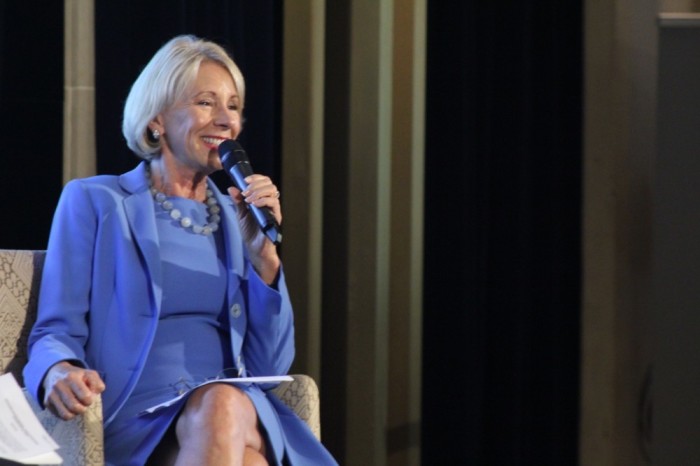Betsy DeVos backs Prison Fellowship push to increase inmates' access to college education

WASHINGTON — U.S. Secretary of Education Betsy DeVos on Monday endorsed a legislative effort backed by evangelical prison ministry Prison Fellowship to make incarcerated inmates eligible to receive federal grants for higher education.
DeVos spoke at Prison Fellowship’s Justice Declaration Symposium at the Museum of the Bible in Washington, D.C., and encouraged the group of about 80 church leaders to lobby congressional offices to support bills that would reverse a longstanding ban on inmates receiving Pell Grants.
Pell Grants are federal subsidies to help low-income students pursue higher education or vocational training. But since the passage of “tough on crime” policies in 1994, incarcerated Americans have mostly been blocked from receiving those grants.
“Education is the ticket to the future for just about anyone and everyone,” DeVos said. “So we should be embracing these opportunities for brothers and sisters who are behind bars today who will be in our communities and with their families and giving them a means for a purpose … and giving them that kind of opportunity to pursue the next right thing for themselves.”
“We all need second chances,” the 61-year-old continued. “It doesn’t matter if we are ever behind bars or not. We all make mistakes and we all need a chance to be redeemed. I think that this, from my perspective, is really a no brainer, to put it in my grandchild’s terminology.”
As criminal justice reform has increasingly become a bipartisan issue, much of the focus has been placed on initiatives to help reduce recidivism. Advocates have stressed that prisons need to do a better job teaching and preparing prisoners to live successful lives once they are released.
In April, bipartisan legislation was introduced called the REAL Act, which would reverse the two-decades-old ban on inmates using Pell Grants to receive higher education or workforce development training.
The legislation comes after the Second Chance Pell pilot initiative was launched by the Obama administration in 2016 and expanded under the Trump administration. Under the initiative, over 12,000 inmates at over 60 sites have been able to take part in college classes or workforce training programs.
The initiative allows colleges, universities and other training programs to partner with local prisons so that incarcerated students can earn things such as two- and four-year degrees. But in order to take the Second Chance Pell initiative out of its pilot phase and make it more accessible to the rest of the nation's over 2 million prisoners, congressional action is needed.
“[The initiative] is due to be wrapped up,” Heather Rice-Minus, Prison Fellowship’s director of government affairs, told The Christian Post. “Our goal is not only to continue and expand those Second Chance sites, but remove the ban on Pell for incarcerated students so any prison or university could have students in that prison facility apply for Pell.”
During her on-stage discussion, DeVos specifically mentioned legislation introduced last week by Sen. Lamar Alexander, R-Tenn., chair of the Senate Health, Education, Labor and Pensions Committee, that would serve as somewhat of a limited Higher Education Act reauthorization.
Among other education initiatives in the package is an expansion of Pell Grants for the incarcerated community.
“While there is ongoing research to demonstrate how important this opportunity is, I have seen through firsthand observation just how important this for individuals that have been reached and served through a Second Chance experimental site,” DeVos said, adding that she spoke at this summer at a graduation ceremony for a Second Chance Pell site in Oklahoma.
“We are committed to expanding those and grow those but Sen. Alexander just last week introduced some higher ed legislation part of which would make Second Chance Pell permanent again. I am very hopeful and I know that some of you [church leaders] are going to be going to the Hill tomorrow. I am very hopeful that you will speak to the importance of that piece of legislation.”
Rice-Minus told CP that a group of about 50 of the 80 church leaders who attended the symposium met Tuesday with the offices of their two home state senators and at least one House office from their home states. She estimated that church leaders met with 39 congressional offices.
Because Alexander recently introduced his bill, Rice-Minus said there would be slightly more focus on the Senate side of Capitol Hill. Democrats on the committee have expressed that they don’t support Alexander’s bill because they want more comprehensive education reform.
However, the bipartisan REAL Act has support from members of both parties in both chambers.
“On the House side, we have been adding more and more Republicans,” Rice-Minus said. “We have six Republicans on the bill now.”
A report released earlier this year by the Vera Institute for Public Justice details how lifting the ban on Pell Grants to inmates would benefit not only the inmates but employers and states as well. The report examines the potential earnings impact of post-secondary education in prisons.
The report stressed that the majority of people incarcerated in America are eligible to take part in post-secondary classes.
“I think the importance of providing education and providing educational opportunities that are relevant and do help to ignite those curiosities and talents is something that the second time around we should be doing if we didn’t do it right the first time around,” DeVos stressed.
Follow Samuel Smith on Twitter: @IamSamSmith
or Facebook: SamuelSmithCP





























